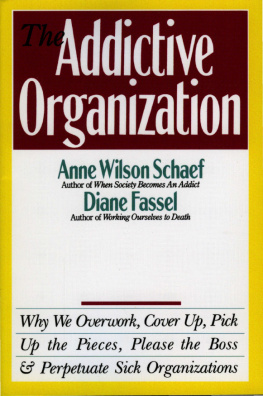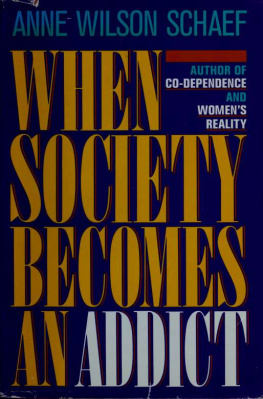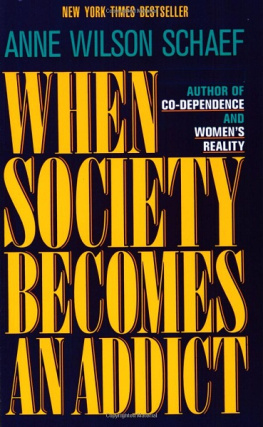Meditations for Women Who Do Too Much - Revised Edition
Women's Reality
"Co-Dependence Misunderstood, Mistreated"
When Society Becomes an Addict
The Addictive Organization (with Diane Fassel)
Escape from Intimacy
Meditations for Living in Balance

Contents
This book is for all of us who work with or relate to an organization and have wondered why we come away from our time at work or our meetings feeling crazy, off balance, and uneasy.
This book is for all of us who have moved into a new work situation with great hopes and expectations and found ourselves slowly ground down by the organization and losing our enthusiasm for the work we love.
This book is for all of us who feel we have to spend our whole weekend recovering from work only to go back and start it all again
This book is for every troubled and/or hopeful organization that has spent thousands, even millions, of dollars on consulting packages and, even when the analysis has seemed accurate, has later discovered that there was no real or lasting change.
This book is for every organization that wants to understand why it continues to move from one crisis to another and is not able to focus on the kind of work it exists to accomplish.
This book is for every organization that truly believes that it is possible to make work-life healing and exciting and still maintain a good profit margin.
This book is for all consultants who genuinely want to be of service to the organizations with whom they consult and have not had the necessary conceptual tools to do what they want to do.
This book is for all of us who have intuitively known that there is something wrong with the way our organizations are structured and functioning and have been searching for the missing pieces.
This book is dedicated to all those persons and organizations with whom we have worked, with whom we are working, or with whom we will work. May it provide a missing piece.
We are grateful to numerous people for their encouragement during the development of this book. Our families and our community in Boulder offered their usual good humor and support. Gwen DeCino, Carol Ewer, John Reed, and Beth Wilson provided an environment that removed all obstacles to working on the book. Client organizations willingly became case material, following the development of our ideas with keen interest. Trainees and former trainees commented on the manuscript in seminars and several read it and made valuable input. Jan Johnson, our editor at Harper & Row, believed in the book from the first day she heard about it and she ably guided it through all phases of production. Finally, we acknowledge the influence of our fathers, Robert Fassel and Virgil Willey, two men who worked in the mainstream of corporate life yet taught us to see another way. To them and to all who have cheered us on in this effort, we are sincerely grateful.
All of the cases and examples we refer to actually occurred and are accurate. However we have changed the names, locations, and identifying details.
Everyone in this society lives and works in some kind of organization, group, or system. Beginning with the family, moving into the school, the workplace, clubs, and civic organizations, most of us spend the majority of our lives within organizations or relating to organizations. In fact, in this society the person who cannot function organizationally is handicapped. We need to understand every aspect of organizational life. Moreover, a broadly focused book on organizations is needed, a book that will be read by corporate executives, entrepreneurs, and the members of volunteer groups and social and professional clubs alike. We saw the need for a book that will name our experience in organizations at all levels.
Even though there is a plethora of books about organizations and corporate life and millions of dollars each year are spent on consultants and packages designed to fix up what is wrong with organizations, corporations continue to search desperately for models that will reverse a slipping economy and enliven a poorly producing work force. Individuals look forward to weekends so that they can recover from their crazy-making experiences at work only to find that they must face the same dynamics on Monday. Often, persons who come from dysfunctional families find their organizations repeating the same patterns they learned in their families. Even though these patterns feel familiar, they do not feel healthy. Though consulting packages seem to alleviate some problems for a few days or a week, those same problems reemerge with even greater force and tenacity. Even after our favorite committees have had workshops on communication skills, breakdowns in communication, dishonesty, isolation, anger, and withdrawals continue. What is going on? What are we missing? As a friend of ours at a Fortune 500 company states in an internal memo, we are confused about something, and it is not clear what it is. In an in-house memo she wrote:
What is a productive organization? We have been inundated in the last few years with books, articles, case studies, and news stories that describe the attributes of excellence and successful organizations. As a country of business people we have studied our competitors. At various times with various voices we have touted high tech, robotic, and electronic solutions. From Europe we have accepted a need for cooperation and collaboration with our employees by starting quality-of-work-life and employee-involvement efforts in major companies like GM, AT&T, and Ford. Unions like the UAW, the Communications Workers of America, and the Steel Workers became leaders in the changes. Yet many of these very hopeful programs have lost their initial charge. We have looked to the East and started Quality Circle, Just in Time delivery programs, Total Quality Control, Statistical Process Control, and Company-Wide Quality Control.
Yet, through all of our writing and research, we still seem to be missing something. We are attracted to these demonstrations of excellence; we recognize that there is something that we do not have, yet the majority of executives and managers in the United States are unable to implement significant permanent change incorporating these ideas. What is it that we are attracted to? What is it that eludes us when we try to implement these changes?
What is it that eludes us when we try to implement these changes? It is the response to this question that has impelled us to write this book about organizations. We believe that it is time to move to a new level of understanding about the organizations in which we live and work. Prior analyses have elements of truth in them, and at the same time a very important element has been systematically ignored.
Ironically, the very correctness of the analysis (even if partial) has been a factor misleading us to accept incorrect solutions. When the analysis has elements of truth in it and rings true for those involved, it is difficult not to become gullible and accept wholeheartedly the solutions offered. Unfortunately, this very gullibility may well be perpetuating the problem. For example, in Steven Prokeschs article in the business section of the New York Times, Remaking the American CEO, we read that many are adopting a new creed that puts corporate survival above all else. The result: a generation of ruthless management. As Prokesch describes it, The new order eschews loyalty to workers, products, corporate structure, business, factories, communities, even the nation. All such allegiances are viewed as expendable under the new rules. With survival at stake, only market leadership, strong profits and a high stock price can he allowed to matter (italics ours). Prokesch sees corporate leaders going through a massive rethinking process, and their response to the imperative to change has been to become more ruthless, more manipulative, more dishonest, more rigid, less creative, and less willing to take risks. We believe this response is indicative of what we have been missing in our understanding of organizations.
Next page










